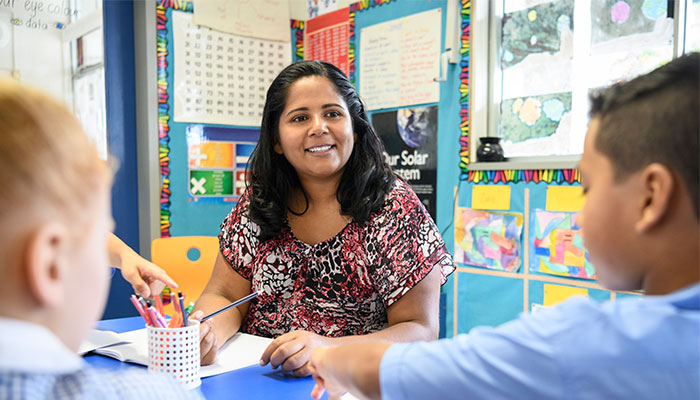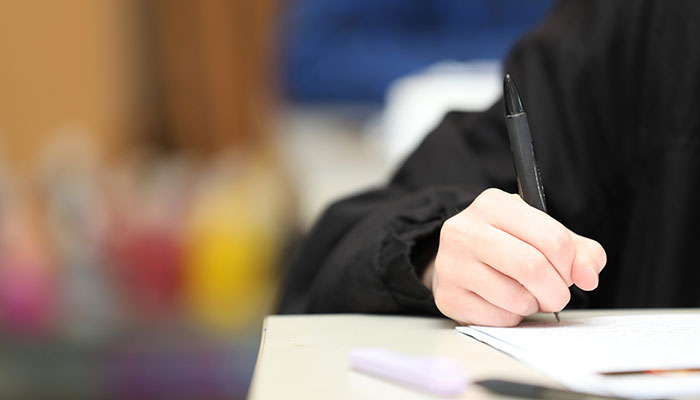NAPLAN looms large in the lives of Australian teachers and students. Improving NAPLAN scores is a consistent target of state and federal education policy and is often a key strategic goal for schools. Each year, NAPLAN sparks renewed discussion of “back to basics” and a hyperfocus on standardised achievement.

However it is critical not to lose sight of the fact that schools and classrooms are inherently social places and learning is a socio-cognitive process. In short, quality relationships, and particularly teacher-student relationships, are key to students’ learning and success.
Building positive teacher-student relationships takes time and needs to be done intentionally. Building these relationships can be challenging when considered alongside the myriad of demands on teachers’ time: lesson planning, adjusting tasks to meet different skill levels in a classroom, assessment, administration, and at this time of year, preparing students for NAPLAN. Despite the recognised importance of these relationships, it can feel as though there isn’t enough time in a lesson to foster these relationships with all students.
Setting aside time to build these relationships is crucial because it is likely to pay dividends over the course of a year. My research has shown that positive teacher-student relationships are shown to be strong predictors of student outcomes in the short and long term. They support increased motivation and engagement, help to keep students on track to complete Year 12, and are associated with higher levels of achievement.
Reminding students that teachers are sources of support and care is key to helping students navigate the stress of NAPLAN and remain enthusiastic about school.
Students who feel more supported by their teachers are more likely to put forward more effort, persist for longer on academic tasks, and enjoy school more – all of which have downstream effects on achievement. In this sense, building positive relationships can be considered a strong investment towards a number of desirable outcomes, including student achievement.
But how do teachers build these relationships? Teacher-student relationships can be broadly thought of as comprising three dimensions:
- Closeness: relational warmth, social support, and emotional support that a student feels from their teacher, so that a student feels their teacher likes them and cares about them as an individual.
- Instructional Support: the feedback and academic guidance, direction, and help that students receive from their teachers.
- Conflict: negative interactions that occur between a student and their teacher. For students, conflict often results from perceptions of unfairness.

The quality of relationships (meaning how positive or negative it is) is dependent on the relative levels of each dimension, with more positive relationships having higher levels of closeness and instructional support and lower levels of conflict.
Building closeness involves engaging in behaviours that demonstrate a teacher knows their students and cares about their interests and future. It is reminding students that teachers see and value them as individuals. Building this sense of closeness can be done in a number of ways, such as connecting the learning materials to students’ lives and following up with them on big life moments (sports carnivals or music concerts for example).
Providing instructional support is something teachers are well trained in. To enhance the instructional support that teachers provide, it is important to consider how the feedback and guidance given to students can be tailored to them. For example, this may be identifying strategies that students can try to avoid consistent mistakes, providing specific advice on how they can progress, and showing students how they have improved on their past work.
Reducing conflict is important in building positive relationships. Consistently applying classroom rules and expectations, as well as listening to and taking students concerns seriously are key steps to reducing conflict. It is important to remember however that conflict is not always avoidable in classrooms; managing conflict well is likely to be more helpful than attempting to get rid of it all together.
As the 2024 cycle of NAPLAN begins and the pressure to achieve ramps up, it is important for students and teachers to slow down and check in. Reminding students that teachers are sources of support and care is key to helping students navigate the stress of NAPLAN and remain enthusiastic about school.
Dr Emma Burns is a Senior Lecturer in educational psychology and an Australian Research Council Discovery Early Career Research Award Fellow in the Macquarie University School of Education.



